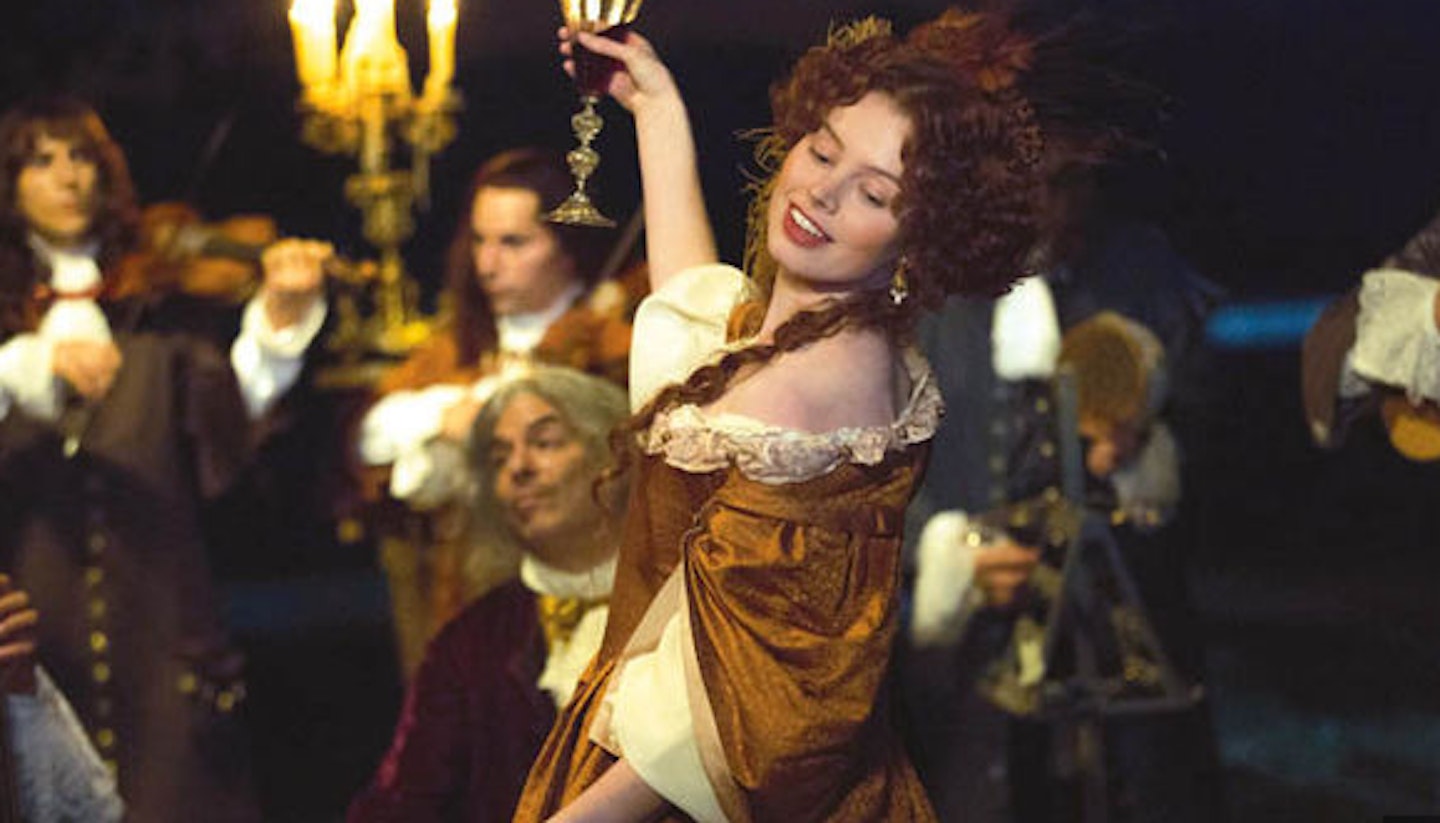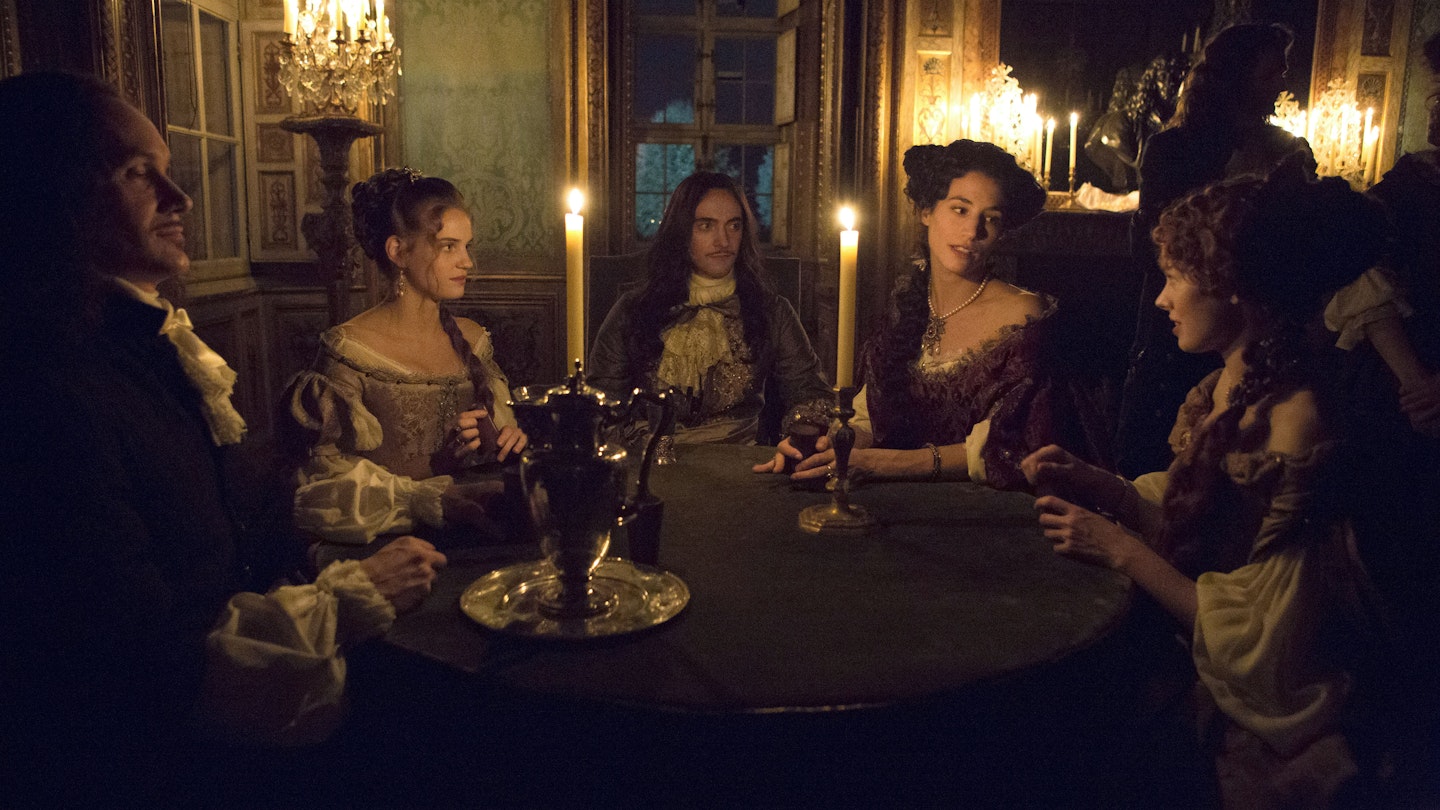More explicit than Game Of Thrones! Twice as expensive as Downton Abbey! Criticised in Parliament by Tory MPs! This summer’s costume drama Versailles swept into the public consciousness on a wave of sensational – and vaguely outraged – headlines.
Taking place in 1667 in the court of the young Louis XIV, the series follows the King’s controversial decision to move the royal seat from Paris to Versailles and create the most dazzling palace in all of Europe. Cue political machinations, cross-dressing, brutal violence and a lot of sex scenes in a re-imagining of the Sun King’s glamorous and treacherous reign.
As the show reaches its close, we caught up with British actress Sarah Winter, who plays the King’s mistress Louise de la Valliere, to talk costumes, off-screen antics, and why the Versailles era still fascinates today…
When you first looked at the script for Versailles, what appealed to you?
It was incredible to see all the classic elements of a period drama, but also to see these exotic-seeming characters, who seem completely unbelievable, yet to know that they actually existed in history.
Did you know much about the period before you started filming?
As soon as I got the part, I started ordering loads of books on Amazon and finding documentaries about the period. Through my geeky research, I found a book that Louise had written herself. It’s not a novel, but a treatise she wrote that looks back on her life in court, the mistakes she felt she made and her reflections on her life with Louis and relationship with God. To have her actual words there on the page made it easy to access her mind set – and to realise how closely [the writers] Simon and David had mirrored how she was. It was so accurately portrayed; this very softly spoke, very pious and sweet girl who was a misfit in court and didn’t seem like she should be there at all.
There’s quite a contradiction in her character.
Yes, everyone else is playing mind games; there’s all these power struggles and everyone wants something from everyone else. All [my character] wants is Louis’ love, but that’s the thing that causes her great pain – it conflicts with her very religious beliefs that she’s having a very public affair with a married man; and like everyone in the court, she’s constantly on show.
What are the challenges of playing someone who is historically real?
There have been quite a few different portrayals of Louise. The Three Musketeers by Dumas is actually dedicated to her, but I think that’s quite a different Louise to this one. Sometimes she’s depicted as quite naughty, sometimes more demure and pious, but I felt that ours was quite accurate from everything I’d read – open-hearted, honest and with a surprising quiet inner strength.

Did the costumes take a lot of getting used to?
It took a really long time to do the hair and make-up every morning. The team were trying really hard to teach me French in the time that they were doing my hair, but I didn’t get much better! They said I would say things very academically. I wrote a whole speech to say to them, but they were like “That was good, but it sounds like you’re at school...” The process reminded me of how long it would’ve taken [the characters] to get ready, and of how importance their appearance was. Fashion was so important – if you had a button or a pearl in the wrong place, it could send a message.
The preoccupation with image and fashion feels quite modern. Did you see a lot of those parallels?
People admiring each other’s outfits; the colours that they chose; not wanting to turn up to the party in the same outfit – it’s still the same thing! You see that happen throughout the series – fashion is a character within the show.
What was it like shooting in France?
The producers said, “Would you mind spending months in Paris?” and I was like, “Oh, go on then!” I became good friends with lots of the cast, especially with Anna Brewster [who plays Madame de Montespan.] We were cast quite early on, so we we travelled over together for early costumes fittings and screen tests – got the Eurostar together, ate lots of cheese and went shopping in Paris to see all the designer names in Printemps and Galerie Lafayette. It’s so beautiful there.

Which was your favourite scene to film?
We did this party which had a gambling scene in it, so they taught us this game to play – I’m not sure whether it was entirely authentic, but it could have been! We played that all night, and ended up singing a lot. I have a video of some of the characters in full costume singing Bohemian Rhapsody; these four heads in the car on the way to set. Long night shoots were actually really fun, but we’d get really hungry – we ended up eating our way through a mountain of candied fruit that was part of the set – if you turned it round to the camera, half of it had gone. That kind of thing happened a lot…
Did you have any awkward moments during filming?
When we needed to go to the toilet in our dresses, it was quite embarrassing – having to ask “please may I go to the toilet?” like at school, then run across the mud in a huge dress to a Portaloo. It was very glamorous.
Why do you think the Versailles era still captures our imaginations?
It was a really dangerous yet really glamorous time, which makes for an intoxicating mix. Louis left behind such a huge cultural legacy, too – the ballet, the music, the fashion and the mannerisms, which makes us feel like we can relate to it now.
Versailles is available to own on Blu-Ray, DVD and digital download now here
READ MORE: Meet Stefanie Martini, Breakout Star Of ITV's Doctor Thorne
READ MORE: Gemma Arterton: 'As You Get Older You Learn To Appreciate Yourself'
